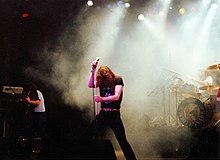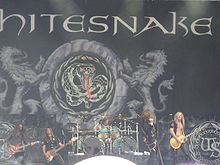Whitesnake
Whitesnake is a British hard rock band founded in 1978 by David Coverdale after his separation from the band Deep Purple, of which he was a member as vocalist. from the end of 1973 to the middle of 1976. In his early years, his music was oriented towards rock, blues and soul, highlighting the album Saints & Sinners, but from 1984, with the release of Slide It In, they gave a notable change to their music, directing it towards the commercial hard rock of the epoch. Along these lines, the band lived its golden age and reached its peak with the release of the album 1987, which brought with it the hit singles "Still of the Night", "Here I Go Again" and the ballad " Is This Love». They closed this stage with Slip of the Tongue in 1989. After this, they have continued to be active at different times and have released some records. In 2019 they returned to eighties hard rock with the album Flesh & Blood, which was praised by his fans.
One aspect that has characterized the band throughout its history has been the inconsistency of its lineups over the years, involving various British and American musicians, with the exception of David Coverdale, founder of the band as leader and sole permanent member.
History
First stage (1978-1986)
In February 1978 David Coverdale and guitarist Micky Moody, who had collaborated with Coverdale on his two solo albums, formed Whitesnake. The rest of the initial lineup would include guitarist Bernie Marsden, bassist Neil Murray, drummer Dave Dowle, and Brian Johnston on keyboards (who would later be replaced by Pete Solley).
In June of that same year his first album would come out, an EP titled Snakebite under the name David Coverdale's Whitesnake. Whitesnake's first proper album would come out in October 1978 under the title Trouble. The keyboard player on the album would be a former partner of David Coverdale in the Deep Purple years, Jon Lord. Several songs would emerge from the album that would become classics over the years such as "Take Me with You", "Trouble", "Lie Down (A Modern Love Song)" and a version of "Day Tripper" by The Beatles.
Their greatest success in this early stage would be achieved with the 1979 album, Lovehunter, which contained songs like «Walking in the Shadow of the Blues», «Medicine Man» and the one that gave its name to disk. Although the most memorable album from this era would be Ready an' Willing from 1980, in which drummer Dave Dowle would no longer be present; in his place another ex-Coverdale teammate from Deep Purple, Ian Paice, would enter. With the release of this album they would reach the top of the charts, with songs like "Fool for Your Loving" and "Blindman".
With the Ready an' Willing would dare to release a double album live, recorded at London's Hammersmith in November 1978 and June 1980. On said double album they would merge the best songs released up to that moment.
In 1981 they released another album, Come an' Get It, very much in the style of the previous one, which would include songs like "Don't Break My Heart Again" and "Come an' Get It». The following year they would record an album, which would only be released in mid-1982, entitled Saints & Sinners, which would include one of their biggest hits, "Here I Go Again", which would become a classic for the group.
At that time, the differences between the members and an illness of Coverdale's daughter would cause an impasse in the band. Upon returning, some time later, the guitarist Bernie Marsden would no longer be there, who would be the first to leave, followed by Ian Paice and Neil Murray. In October 1982 they would present a renewed formation: guitarist Mel Galley (ex Trapeze), bassist Colin Hodgkinson and sitting on drums would be the legendary Cozy Powell (ex Jeff Beck, Rainbow and Black Sabbath, among other groups).
During the last months of 1982 and early 1983 they would tour the Saints & Sinners and in late 1983 and early 1984 they would record Slide It In, which contained songs like "Love Ain't No Stranger" and "Slide It In" itself. Before starting the tour, guitarist Micky Moody would also leave the band and be replaced by John Sykes (ex Thin Lizzy).
Arrival of success (second stage) (1986-1990)
In the middle of the tour, Neil Murray would return and with that formation, Whitesnake would appear at the first Rock in Rio, in 1985, with great success. By late 1986, the band consisted of John Sykes on guitar, Aynsley Dunbar on drums, and Neil Murray on bass. With the addition of Don Airey on keyboards, all of them would record Whitesnake (known in Europe as 1987), the best-known and best-selling album in their history, released in 1987.
With that edition, Whitesnake would achieve megastardom in the United States, but his musical style, as a result of the search for this new market, would turn a few degrees in the direction of the more commercial hard rock of the time, like glam metal, and to the same extent, it would move away from its more bluesy roots.
The first singles taken from that album would be the ballad "Is This Love" which would become a cult song and the reissue of the song "Here I Go Again", which would become one of the most successful singles by Whitesnake and a true hard rock classic.
To the chagrin of fans and the press, Coverdale would expel his star guitarist John Sykes (at the time it was speculated that the reason was a dispute over stage leadership) and Adrian Vandenberg and Vivian Campbell (formerly Dio) would join his replacement, Rudy Sarzo (ex Quiet Riot) would take over on bass and Tommy Aldridge on drums.
Steve Vai's stage as a guitarist
In 1989, Steve Vai (formerly Frank Zappa and David Lee Roth) would replace Vivian Campbell and join the group. Steve Vai was already one of the best guitarists in the world at that time, having just released his Passion and Warfare , his most successful album to date.
Steve would be in charge of recording all the guitars for Slip of the Tongue by himself, because Adrian Vandenberg would injure himself doing some exercises, causing tendonitis. Later, Adrian would return for the album tour.
Coverdale would reissue another of his classics for this album, this time it would be «Fool for Your Loving», which would also make the album a great success, although not as much as his previous work.
Concerts on the Slip of the Tongue tour include one of the most famous festivals in history, the hugely successful 1990 Monsters of Rock.
First separation (1990-1994), failed comeback (1994-1997) and second separation (1997-2003)
At the end of the tour in 1990, the band would practically fall apart. At the end of 1993 Coverdale and the emblematic guitarist of Led Zeppelin, Jimmy Page, would publish together an album titled simply Coverdale-Page, which would quickly become a best seller, but which would have a cold reception on the part of the "nostalgic" press, clamoring for a Led Zeppelin reunion, which would finally come to fruition the following year with the release of the album No Quarter by Jimmy Page and Robert Plant.
A compilation album, Whitesnake's Greatest Hits, would be released in 1994; in it would be a new version of "Here I Go Again". The band would resume activity with Warren DeMartini (Ratt) and Adrian Vanderberg on guitars, Rudy Sarzo on bass, Paul Misckovick on keyboards, and Denny Carmassi on drums. In 1997 they would publish Restless Heart, which would cause minimal impact compared to expectations and would not even be released in the United States. An acoustic album would later be released entitled Starkers in Tokyo performed by Coverdale and Adrian Vandenberg only, which would contain songs from all Whitesnake eras plus Deep Purple's "Soldier of Fortune".
Coverdale would decide to disband the band and continue his solo career. The Farewell Tour (farewell tour) would end in Argentina, at the Ferro Carril Oeste stadium (December 12, 1997) in a very emotional way but under a rain of criticism about the singer's poor vocal performance.
In September 2000, a solo album by David Coverdale called Into the Light came out, which would not get good reviews either.
Definitive return of the group (third stage) (2002-2007)
In December 2002 Whitesnake would regroup for their 25th anniversary tour. After this, the band would continue to perform live concerts, would edit a live DVD in 2005 of the 2004 tour and a couple of compilations in 2006.
One of the most recent formations with which they reactivated the group would be made up of non-British members (with the exception of their leader): David Coverdale voice, Doug Aldrich (ex Bad Moon Rising and Dio) and Reb Beach (ex Winger and Dokken) on guitars, and lesser known keyboardist Timothy Drury, bassist Uriah Duffy, and drummer Chris Frazier.
In November 2006 the album Live: In the Shadow of the Blues would be released with four unpublished songs: «All I Want Is You», «Dog», «If You Want Me» and « Ready to Rock”. The promotion of the album would be done through acoustic concerts in different European cities.
Good to Be Bad and return to tours (2008-2010)
In April 2008 Whitesnake would release their tenth studio album, entitled Good to Be Bad, where they would return to their more bluesy roots with songs like «A Fool in Love», «Good to Be Bad » and «Best Years». Unlike the previous ones, it would garner very good reviews and would partially restore the band's name in international rock.
On August 11, 2009 Whitesnake would perform a show at Red Rocks in Morrison, Colorado, where David Coverdale would suffer a vocal injury. After seeing a specialist, it was announced the next day that Coverdale was suffering from severe vocal cord edema and an occasional lesion to his left vocal vascular fold. For said reason, the band would have to withdraw from the rest of the Judas Priest tour.
In early February 2010, David Coverdale reported that his voice seems to have fully recovered from the traumas that sidelined him and his band on the Priest tour. He would comment that lately he had been recording demos, with the aim of a new Whitesnake album, and his voice would sound full and strong on the tapes he has recorded.
In June 2010, the band would announce the release of their own wine, a 2008 Zinfandel, described by David Coverdale as "filled to the brim with the spicy essence of sexy, slippery Snakeyness... Highly recommend to complement any tub." hydromassage in which they want to have fun...»
On June 18, 2010, bassist Uriah Duffy and drummer Chris Frazier would part ways. Frazier's replacement would be former Billy Idol drummer Brian Tichy. On August 20, 2010 Whitesnake announced that their new bassist is Michael Devin.
On September 13, 2010, keyboardist Timothy Drury would leave the group to pursue a solo career.
Forevermore (2011-2015)
By March 2011 the band would release a new album after two years. The title of the new album was Forevermore, and in order to promote it, they scheduled a concert tour throughout the year with dates announced on their official website. They consisted of six presentations in the United Kingdom and others in the rest of the European continent.
Forevermore would be published in a special edition called Snakepack through Classic Rock magazine and would go on sale on March 25, three weeks before its release. commercial.
A digital single of the song "Love Will Set You Free" would be released, along with its music video, on February 21, 2011.
On March 20, 2011 Whitesnake would recruit Brian Ruedy as their new keyboardist for their 2011 Forevermore World Tour.
On March 25, the Amazon.co.uk website reported that customer pre-orders for the group's new album far exceeded those for Britney Spears' new production, Femme Fatale by a distant 35%, indicating that the grouping continues to have some significant currency among British consumers.
Whitesnake would perform as one of the main attractions at the annual Rocklahoma Festival in Pryor, Oklahoma, on Memorial Day weekend in May 2011. That same year he would be part of the Judas Priest world tour called Epitaph WorldTour.
In June 2013 the group toured Spain with two other classic hard rock groups, Def Leppard and Europe.
On May 9, 2014, it was announced that Doug Aldrich would be leaving Whitesnake to begin his solo career. On August 21, it was announced that Joel Hoekstra would be the new guitarist for the band.
The Purple Album (2015-2017)
On February 25 it was announced that The Purple Album would contain new versions of songs Coverdale recorded with Deep Purple. The album art was released on May 15, 2015 by Frontiers Records.
On April 17 it was announced that Italian instrumentalist and vocalist Michele Luppi would be the new keyboardist for the band, replacing Brian Ruedy. The album peaked at number 18 on the UK Albums Chart and entered at number 84 on the Billboard 200 Album Chart in the US.
In August 2017, Whitesnake signed a distribution deal with Rhino Entertainment in North America and Japan and internationally with Parlophone, with reissues of their records, including Whitesnake (1987).
Flesh & Blood (2019-present)
On December 4, 2017 through Rhino Entertainment, the band announced the arrival of a new album for 2018 with the title Flesh & Blood. However, to the surprise of the public, the album was delayed due to technical problems, according to the band members, and was finally released in May 2019. With this album, the band returned to their roots of hard rock from the 1980s.
Members
Current members
- David Coverdale – Voice (1976-1991, 1994, 1997-1998, 2002-present)
- Reb Beach – solo guitar, choirs (2002-presente)
- Joel Hoekstra – solo guitar, choirs (2015-presente)
- Tanya O'Callaghan – electric, choirs (2021-present)
- Michele Luppi – keyboards, choirs (2015-presente)
- Tommy Aldridge – drummer, percussion (1987-1991, 2003-2007, 2013-present)
Timeline

David Coverdale's Backing Bands - transformed into Whitesnake (1976-1978)
More than a creation, Whitesnake was an evolution. It was formed during the post-Deep Purple process in David Coverdale's solo career. He began working with classic Whitesnake guitarist Micky Moody on his two solo albums. The 1978 band that Coverdale had used on his tour (to support his album Northwinds ) was what would soon become the first Whitesnake.
| Period | Lineup | Launching |
|---|---|---|
| David Coverdale Band
(1976-1977) |
with
|
|
| David Coverdale Band
(1977) |
|
|
| David Coverdale Band/Whitesnake
(1978) |
|
Early Whitesnake era (1978-1991)
When Whitesnake reformed in 1982 after a brief hiatus, Coverdale called up just Moody and Lord, and they settled for a few years in the band. The session musicians needed to complete Whitesnake's 1987 album of the same name only played on the song Here I Go Again 87 (other than keyboards), as this song was not finished when the band was dissolved.
| Period | Lineup | Launching |
|---|---|---|
| David Coverdale's Whitesnake
(1978) |
|
|
| Whitesnake (1978-1979) |
|
|
| Whitesnake (1979-1982) |
|
|
| Whitesnake (1982-1984) |
|
|
| Whitesnake (1984) |
|
|
| Whitesnake (1984) |
with
| |
| Whitesnake (1985-1987) |
with
|
|
| Whitesnake (1987-1988) |
| |
| Whitesnake (1988-1989) |
with
| |
| Whitesnake (1989-1991) |
|
|
Second era of Whitesnake: temporary reunions (1994-1998)
Denny Carmassi would join Whitesnake for the 1994 Greatest Hits Reunion tour, organized shortly after Coverdale wrote the new compilation. Carmassi, Guy Pratt and Brett Tuggle would join the band in 1997 for Restless Heart (although this was initially intended to be a solo David Coverdale project; Pratt and Tuggle left before the promotional tour from the album).
| Period | Lineup | Launching |
|---|---|---|
| Whitesnake
Greatest Hits Tour (1994) |
| |
| The band was separated (1995-1997) | Coverdale worked on his solo album, returned with Restless Heart | |
| David Coverdale & Whitesnake
Restless Heart Reunion (1997) |
|
|
| Whitesnake Unplugged (acoustic)
(1997) |
|
|
| David Coverdale & Whitesnake
Restless Heart Reunion Tour/Whitesnake Farewell Tour (1997) |
| |
| The band separated (1997) | Coverdale took a break after an agitated tour | |
Third epoch of Whitesnake: reformation for the 25th Anniversary (2002-present)
In 2002, Whitesnake underwent a complete makeover. Unlike the reunions of the mid-1990s, this is a full-time lineup that previously existed in the 1970s, 1980s, and 1990s.
| Period | Lineup | Launching | |
|---|---|---|---|
| Whitesnake
25th Anniversary Reformation (2002 - 2005) |
|
| |
| Whitesnake (2005-2007) |
|
|
|
| Whitesnake (2007-2010) |
|
|
|
| Whitesnake (2010–2011) |
|
| |
| Whitesnake (2011–2013) |
|
|
|
| Whitesnake (2013–2014) |
|
| |
| Whitesnake (2014–2015) |
|
| |
| Whitesnake (2015–2021) |
|
|
|
| Whitesnake (2021–present |
|
Discography
- Albums of study
- Snakebite (1978)
- Trouble (1978)
- Lovehunter (1979)
- Ready an Willing (1980)
- Come an' Get It (1981)
- Saints & Sinners (1982)
- Slide It In (1984)
- Whitesnake (1987)
- Slip of the Tongue (1989)
- Restless Heart (1997)
- Good to Be Bad (2008)
- Forevermore (2011)
- The Purple Album (2015)
- Flesh & Blood (2019)




